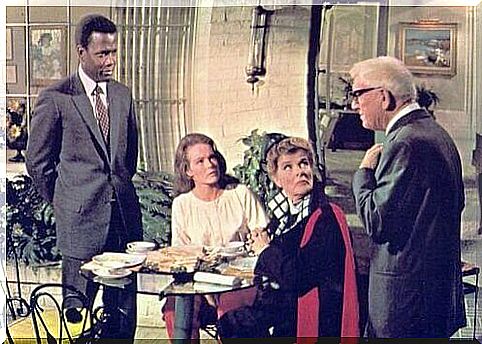When Your Family Affects Your Relationship

If family is affecting your relationship, things can get very complicated. You may need to learn to deal with situations that you were not prepared for and did not ask for. While we may not think of it this way, when choosing your partner, choose your family as well.
Interfamily dynamics, conflicts and quarrels are very common. In addition, the magazine Psychology Today published a study which showed that three out of four couples have significant problems with the in-laws. The study also showed that an alarming 60% of women have problems with their partner’s mothers.
In some ways, we’re reminded of the amazing Stanley Kramer movie, Guess Who’s Coming to Dinner. In this film, a young woman decides to get engaged to a black man and brings him home to meet her parents. How her parents handle the situation is a good summary of what these kinds of conflicts are often about. Parents often believe that they have educated their children well and instilled certain values in them, but after all, they choose partners who do not necessarily fit the family’s expectations.
Parents often consider their children to be free people who are able to make their own choices. Instead, they see them as personal projects on which they can project their own set of ideals. So when they start a relationship with someone, the parents are often disappointed.

Between a rock and a hard place: When your family rejects your partner
There are many different types of families. As Oscar Wilde said, nothing is more sealed and mysterious than the home, where you can close the curtains and no one knows what’s going on there. Of course, some parents are emotionally stable and understand boundaries. They are fully capable of having a respectful and healthy relationship with their children’s significant others.
However, sometimes the opposite is true. Sometimes family dynamics are toxic, controlling and even authoritarian. It is easy to start a relationship with someone and be completely unaware of their toxic family dynamics. The classic example is problems with the in-laws, but people often forget other problems. It can be sibling rivalry, difficult cousins, critical aunts and uncles, grandparents sticking their noses into everything, etc.
A family can be like its own little universe with its own laws and dynamics. You may have a conflict with older relatives trying to assert their authority or with passive-aggressive mothers. Disagreements over child rearing are a very common one, along with quarrels over religion and politics. You may feel that your family does not approve of you and that you are not good enough. When some of it occurs and begins to affect you, it throws everything off balance. When the family crosses the line, you need to find a way to redirect the situation without causing harm. It can be very difficult.

What you can do when your family affects your relationship
Some choose the most extreme path. For example, they force their partner to choose between them and their family. Some families end up taking sides. Others choose silence and just letting things happen. They sometimes become the scapegoat who endures all the love of their partner. Whichever way, sooner or later, they all lead to some kind of conflict.
As tempting as it is to want to completely exclude your partner’s family, it usually does not solve the problem. The good news is that there are better alternatives. Here are some strategies that can help:
- Maintain constant communication with your significant other. You need to tell them how you feel about what is happening. Avoid criticism. Just try to express the truth about what is happening without offending or offending anyone.
- Every family is different. It is important to distinguish between what is acceptable and what is not. There is a difference between understanding and letting yourself be abused.
- Make a deal with your significant other about your boundaries. You should both have a clear idea of what you are comfortable with and where you set the limit. Even if you and your partner agree on everything, you need to set the rules for the family so that everyone is on the same page.
- You should also let your family know what about their behavior that is hurtful or annoying. The critical mother-in-law, the intolerant brother, the controlling father… Practice self-confidence and convey your discomfort so that they understand the impact of their behavior. Talk about options that can help improve the quality of the relationship.

Dealing with the problem can strengthen your relationship
Finally, although family sometimes affects your relationship, it is not always a bad thing. Sometimes the in-laws can be wonderful, welcoming and even be there for you in times of crisis. However, if they have a bad influence on your relationship, you need to talk to your partner about how to deal with it. That way, you will both be on the same page, and your partner will support you when difficult situations arise. If you deal with family issues in a mature and timely manner, your relationship will improve in the long run.
When your family is influencing your relationship, the most important thing is to reach an agreement with your significant other about what steps to take.








